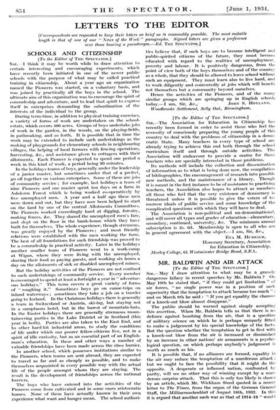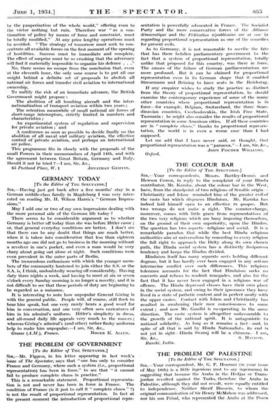MR. BALDWIN AND AIR ATTACK [To the Editor of THE
SPECTATOR.]
Sin,—May I draw attention to what may be a gravely dangerous fallacy in recent speeches by Mr. Baldwin ? On May 19th he stated that, " if they could get limitation " of air forces, " no single power was in a position of such superiority that the temptation to attack became too much " ; and on March 8th he said : ":If you get equality the chances of a knock-out blow almost disappear."
The public should be warned against simply accepting this assertion. When Mr. Baldwin tells us that there is no defence against bombing from the air, that is a question of military science on which he is perhaps uniquely fitted to make a judgement by his special knowledge of the facts. But the question whether the temptation to get in first with a knock-out blow from the air is increased or diminished by an increase in other nations' air armaments is a psycho- logical question, on which perhaps anybody's judgement is worth as much as his.
It is possible that, if no alliances are formed, equality in the air may reduce the temptation of a murderous attack ; but we ought to face the possibility that it might do the opposite. A desperate or inflamed nation, confronted by parity, will see no other way of winning except by a mur- derous surprise attack. That this is only too likely is shown by an article, which Mr. Wickham Steed quoted in a recent letter to The Times, from the organ of the German General Staff, the Militaerwochenblatt of August 18th, 1932. In this it is argued that another such war as that of 1914-18 " would
be the pauperization of the whole world," offering even to the victor nothing but ruin. Therefore war " as a con- tinuation of policy by means of force and constraint, must be totally modified." At any price lengthy operations must be avoided. " The strategy of tomorrow must seek to con- centrate all available forces on the first moment of the opening of hostilities. Success must be immediate and complete. The effect of surprise must be so crushing that the adversary will find it- materially impossible to organize his defence . . ."
No, there seems no escape from the conclusion that, even at the eleventh hour, the only sane course is to put all our weight behind a definite set of proposals to abolish all national air forces and transfer civil aviation to international ownership.
To nullify the risk of an immediate advance, the British Government might propose : The abolition of all bombing aircraft and the inter- nationalization of transport aviation within two years ; The retention meanwhile of small national air forces of short-range interceptors, strictly limited in numbers and characteristics ; An experimental system of regulation and supervision for private aviation ; and A conference as soon as possible to decide finally on the abolition of all naval and military aviation, the effective control of private aviation, and perhaps an international air police.
This programme fits in closely with the proposals of the small Powers in their memorandum of April 14th, and with the agreement between Great Britain, Germany and Italy. Should it not be tried ?—I am, Sir, &c.,





































 Previous page
Previous page